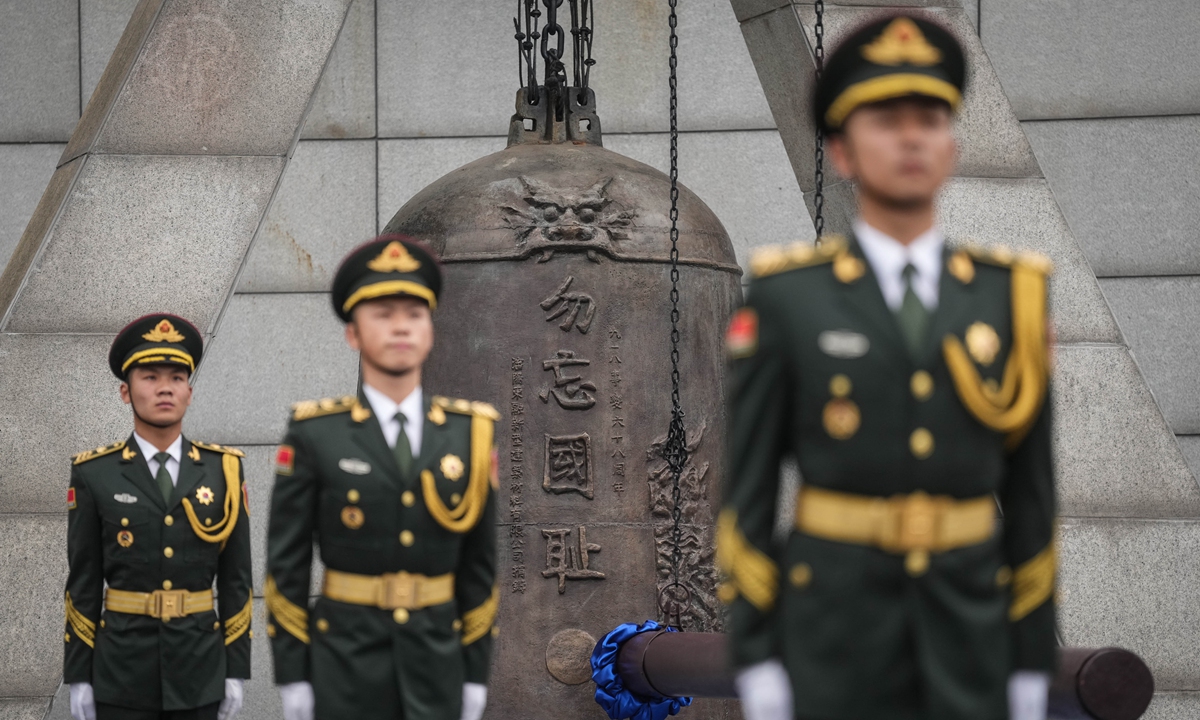
People's Liberation Army soldiers participate in a ceremony to commemorate the September 18 Incident at the 9.18 Historical Museum in Shenyang, capital of Northeast China's Liaoning Province, September 18, 2024. The ceremony was held to mark the 93rd anniversary of the September 18 Incident in 1931 when Japanese troops began the bloody invasion of China. Photo: Xinhua
Air raid sirens sounded in cities across China, ordinary citizens paid silent tributes, historical materials disclosed for the first time unfolded once again the tortured history to the public, and social media was flooded with messages of "Never Forget the National Humiliation"!
China observed the 93rd anniversary of the September 18 Incident on Wednesday, marking a day of paying a poignant tribute to the past and making a clarion call for peace.
While the war has long since ended, recent developments have reignited concerns among peace-loving people in China and the wider international community. Japan's record military budget and provocative words and actions on the Taiwan question and South China Sea issues, coupled with the controversial ritual offering by Japanese Prime Minister Fumio Kishida to the infamous Yasukuni Shrine last month, have raised alarms about the dangerous trend of turning right in Japanese politics, observers warn.
Also, as Japan approaches the presidential elections of its ruling Liberal Democratic Party in late September, major factions dissolving amid political funding scandals has led to a chaotic situation in this election. The ineffective faction-led intra-party competition mechanism may give rise to populist politics designed to attract attention, further complicating Japan's political landscape and increasing uncertainty about its future direction, according to Chinese observers.
In Shenyang, capital of Northeast China's Liaoning Province, the September 18 Incident History Museum hosted a ceremony that brought together representatives from various sectors of society to honor the fallen heroes.
In a significant exhibition at the Memorial of Northeast China Revolutionary Martyrs, a rare national-level artifact was unveiled on Wednesday - a 1939 map detailing the Japanese military's systematic immigration of settlers into Northeast China, CCTV reported.
Moreover, the exhibition featured a collaboration with Japanese scholar Makoto Matsuno, who presented newly discovered documents related to the notorious Unit 731, known for its inhumane biological warfare experiments. These findings are crucial for understanding Japan's wartime atrocities and represent a joint effort to confront and expose the historical truths surrounding these crimes.
On Chinese social media, the resonance of this commemoration was palpable. As of press time, the topic "93rd anniversary of the September 18 Incident" has garnered approximately 230 million views on Sina Weibo.
In an interview, reflecting on the 93rd anniversary of the September 18 Incident, Yuji Miyamoto, president of the Japan-China Friendship Center and former Japanese ambassador to China, shared his insights on the historical significance of this event.
"The starting point for our reflection on history must be the September 18 Incident," Miyamoto noted.
Xiang Haoyu, a research fellow in the Department for Asia-Pacific Studies, China Institute of International Studies, told the Global Times that we still need to be vigilant against Japan's moves to stir up geopolitical conflicts and fuel an arms race in the region, bringing negative impact on regional peace and stability. The fundamental reason for this is that, Japan lacked an objective understanding of and deep reflection on its past, said Xiang.




